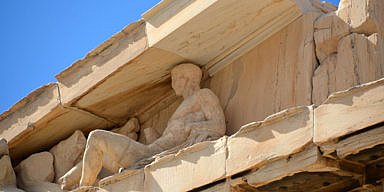I got this Greek joke from my buddy Giorgo the other day and it goes like this: There’s this guy under a small bridge and two hot chicks are crossing it in miniskirts and no panties so this guy looks up and starts whistling at them but they pay no attention so as soon as the girls cross the bridge he proceeds to do… you know what. As he’s “going about his business” a group of men is crossing the same bridge and catch this dude shall we say “pleasuring himself” and start laughing and making fun of him. So the guy under the bridge with his pants down to his ankles starts yelling “ What are you looking at MALAKES? MALAKES, MALAKES MALAKES”
Ask any “xeno” what Greek word he or she knows and “Malaka” has to be at the top of the list. I don’t know what it is but if we Greeks had trademarked “Malaka” we wouldn’t need to export feta, olive oil or dry figs from Kalamata, we would all be rich! You meet any “xeno” and if your last name ends in “opoulos” the first thing out of their mouth is “Malaka” and then they act all embarrassed as if it’s a bad word and ”I shouldn’t of said it” and ask “what does that mean?” because they know it’s bad but not it’s exact meaning.
I was involved in a situation where some harsh words were exchanged between myself and the pizza dude next door (I know you won’t believe this but no he’s not Greek) and he turns and with an accent you find in Toumpa Thessaloniki from a MPAOK fan where the “L” is drawn out he called me a MALLLAKA and then there was the time when one of my Mexican employees pulled me to the side and said to me “boss, you good guy but please don’t call me malaka” and I had to explain to him that I was calling him malaka because I liked him. Lesson for all you Greeks out there: watch who you call malaka, you might offend a non-Greek. Yes indeed malaka has penetrated the American dictionary and is now used by all cultures in the melting pot so we need to act fast, can someone patent it? Never mind we then become “Malakes me patenta”.
In ancient Greece the word “Malakas” meant “mentally ill” and came from the word “malakono” which means “to soften” (μαλακώνω) and it appears in the Greek Orthodox church scriptures which differentiates it from physical illness (νόσος) “από πάσαν νόσον και μαλακίαν”. Latin “malacia” refers to a calm ocean.
Have you ever given the word “Malaka” any thought? and I’m not talking about what the literal translation is but the broadness of the word, it’s effect and how it changes from something bad to a word of praise, or to describe one who’s defiant or loud etc?
Here are a few examples:
If someone stares at you, you say “what are you looking at re Malaka?” or if your friend does something stupid he’s “such a Malaka”. If someone is defiant about something he’s a “boneheaded Malaka” or if the guy next to you at the movie theater won’t shut up you can say “shut up re Malaka”. Then there’s the new waiter at your favorite BYO that walks slower than my 98 yr. old grandmother “movare re Malaka” or your Greek roommate in college who sleeps till 2pm “wake up re Malaka” and how’ bout when you forgot your cell phone at home but didn’t realize it until you got to work you say to yourself “your such a Malaka”. Your friend Pano calls from Astoria NY “and as soon as you pick up the receiver you say:: yia sou re Malaka” and if he visits you it’s “pousai re Malaka” . Then there’s the “Malaka” college professor that gave you a bad test score and the “arxi-Malaka” school president not to mention that “Malakismeni” Statistics lady professor.
“Malaka” doesn’t describe only an individual, it can describe a sports team, a race or a nation. In the eyes of many Greeks with what’s going on the Germans are “Malakes”. Then there are OUR Malakes, we call our buds “Malakes mou” and with that we show brotherhood. Then there’s the friend who falls for the wrong girl and we advise him “don’t be a Malaka” or the guy who keeps messing up “E MALAKA” and how about the guy who’s a jerk and hurts someone’s feelings “why are you such a Malaka?”.
The great thing with “Malaka” is that it can be used at kids too. “Come here re Malakismeno” (for 12 and under only) and to our wife, sister or girlfriend “eisai Malakismeni ”and how bout the guy that’s obese he’s a “Hontro-Malakas”. Then we have the king of Malakes, “Malakas me perikefalaia” Or the guy that doesn’t see where he’s going and bumps into something “are you blind re Malaka?” or the guy who’s called malaka by everyone he’s a “grand Malaka” or the guy who’s a “Malaka and a half” and let’s not forget the one who was “born a Malaka and will die a Malaka” or the “Malaka with a capitol M” or the guy that says something that shocks us “I stood in awe lke a Malaka”.
James D. Fabion in his book Modern Greek Lessons A primer in Historical Constructivism http://press.princeton.edu/titles/5288.html says that the word “Malakas” highlights failures of social or intellectual finesse to which I say “Malakies”. If your soccer club Mr. Fabion had a log as a center forward that was slower than the new waiter at the BYO restaurant who’s slower than my grandmother (yes I’m talking about Panathinaikos’ striker Toche) you would say “o malakas” also.
We’ve been told all our lives how great the Greek language is and how it’s used in science, math and medicine with Greek words everywhere, well the word Malaka has to be the richest and most meaningful word that we Greeks have contributed to the modern world. Problem is that our fellow Greeks in Greece “piastikan Malakes” and now will have to dig themselves out of a “Malakismeno situation”.


